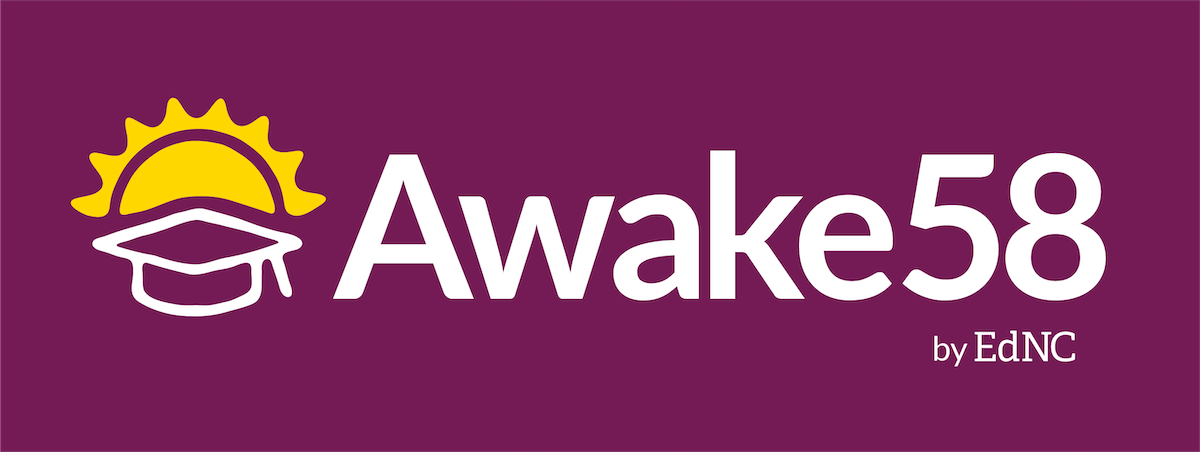A note from us
Welcome to Awake58 — a weekly newsletter where you’ll find the latest updates on community college related news and events around the state. Plus, a look at what’s trending nationally in higher education.
If you’re new to Awake58, welcome! If you were forwarded this email, you can sign up for the Awake58 newsletter here. You can also find last week’s edition on our website.
Updates from western North Carolina as community college leaders grapple with the impacts of Hurricane Helene… A funding opportunity from Dogwood Health Trust… Enrollment for the new State Health Plan is open through Oct. 25… And the legislature is back in session this week…
Good morning,
Molly Urquhart and Hannah Vinueza McClellan here, filling in for Emily Thomas as she reports on the ground in western North Carolina on the impact of Hurricane Helene. Last week, Emily visited McDowell Tech, A-B Tech, Blue Ridge, and Haywood community colleges, and this week she will be at Western Piedmont Community College and back at Blue Ridge. You can see updates from Emily on LinkedIn and X. If you see her out and about, please thank her for her tireless efforts to lift up the stories of our western NC communities.
As search and rescue efforts continue, we are getting a clearer picture of the devastation wrought by Hurricane Helene. The death toll has risen to over 100 in North Carolina, with many still missing. Over the weekend, two counties were added to the federal disaster declaration — Swain and Mecklenburg — bringing it to a total of 27 counties and the Qualla Boundary. And as of 11 a.m. on Oct. 7, 138,324 North Carolina customers were still without power.
We are continuing to update our story on school district and community college closures. Several colleges are reopening this week. A-B Tech, Blue Ridge, Haywood, and Mayland community colleges remain closed.
On Oct. 3, Dogwood Health Trust’s board of directors approved more than $30 million in initial relief funding following the devastation from Hurricane Helene, including a $10 million grant to the Emergency and Disaster Response Fund (EDRF) at the Community Foundation of Western North Carolina. EDRF is funding organizations, including nonprofits and public agencies, providing emergency relief to those affected by Hurricane Helene. Initially, $25,000 grants will be awarded on a rolling basis. Read this EdNC article to learn more about deadlines and how to apply.
In other news, the legislature is back in session this week and set to take up an initial hurricane relief package on Wednesday, Oct. 9. In a press release, Republican leadership said: “Our hearts are broken for the communities that have been ravaged by Hurricane Helene. Despite the destruction, it has been incredible to see how North Carolinians have stepped up to help. We cannot let up on those efforts or forget about the small communities that have been effectively closed off because of this storm.”
It is also possible that Republican lawmakers override Gov. Cooper’s veto of the mini budget, which the General Assembly passed last month. Stay tuned for updates.
Finally, don’t forget that open enrollment for the State Health Plan runs from Sept. 30 to Oct. 25, 2024. During open enrollment, state employees will need to select their primary care provider and can reduce the monthly premium by $60 by completing the tobacco attestation.
Emily Thomas, Chantal Brown, and Alli Lindenberg from our team will be at the system conference in Raleigh next week, and EdNC will have a booth in the exhibit hall — come say hi! Also spread the word about the NCCCS donation drive and bring supplies (more information in Around NC section).
Thank you for reading, and for all of the important work you do across our state.
Stay safe,
Molly and Hannah
EdNC reads
Nonprofits, faith-based organizations, and public agencies: Here is what you need to know about relief grants from regional fund
Dogwood Health Trust recently announced more than $30 million in initial relief funding following the devastation across western North Carolina (WNC) from Hurricane Helene.
This funding responds to short-term, immediate needs and was approved by a unanimous vote by the full board of directors at an emergency meeting on Oct. 3.
In this initial relief funding, Dogwood is prioritizing support for local organizations that will help local people and organizations now and in the days to come, according to the press release.
Dogwood’s initial support is organized in three areas:
- Supporting organizations that can quickly deploy resources and respond to urgent needs of people and geographic areas most affected;
- Supporting assessment, navigation, and legal services associated with FEMA response; and
- Maintaining critical health services across the region.
“Hurricane Helene has affected the people and communities of Western North Carolina in unimaginable ways,” said Dr. Susan Mims, CEO of Dogwood Health Trust. “Our response includes this funding for short-term relief, and we will be here for long-term recovery and rebuilding as well. We are working with our funded partners to get resources to all our neighbors in need throughout the region.”
Learn more about the funding here.
An early look at the impact of the hurricane on community colleges, including how you can help
Updates from EdNC’s early reporting on the impact of Hurricane Helene:
“Hurricane Helene has left western North Carolina’s community colleges and their communities reeling,” says this press release from the N.C. Community College System (NCCCS). “Now, these colleges are stepping up to lead the recovery.”
More than 6,000 employees and nearly 74,000 students are impacted by the storm damage as colleges work to support their communities, the system currently reports, with many serving as emergency response locations while working to reestablish campus operations.
Based on EdNC’s early reporting, we are most worried about Mayland Community College — all three counties Mayland serves were particularly hard hit. We have been in touch with President John Boyd and Sen. Ralph Hise.
Read more here.
In McDowell County, education leaders band together in the wake of Hurricane Helene
Emily Thomas visited McDowell Tech last Monday, Oct. 1, where leaders from McDowell County Schools, McDowell Technical Community College (MTCC), and Centro Unido Latino Americano were working around the clock to organize a distribution site.
Emily spoke with county leaders, including MTCC President Dr. J.W. Kelley:
MTCC President Dr. J.W. Kelley said the county is currently in phase one. Beyond search and rescue, phase one includes distributing food, water, and items for babies.
Planning for phase two is currently underway and will include what Kelley is calling comfort centers, or locations where community members can use Wi-Fi or make phone calls. Leaders have even discussed how to coordinate with the hospital to provide on-site emotional support animals.
She also spoke with community members, including two McDowell County Schools students, Lillian and Freya, who were helping out at the distribution site.
Check out her article for the incredible stories and photos as the community worked together to organize a response and help those in need.
Haywood Community College uses lessons learned from previous floods to help in Helene recovery
Emily Thomas reports from Haywood Community College:
“When the flood happened three years ago, we could wrap our arms around the communities affected,” said Dr. Shelley White, president of Haywood Community College. “But now, we are all having to wrap our arms around each other.” …
In the hours after the storm, college leaders worked with county officials, using campus parking lots as hosts sites for search and rescue crews. HCC’s IT Network Administrator, Justin Stocker, activated its emergency Wi-Fi system, a redundant internet system recently acquired through the NC Rural Broadband initiative, White said.
The Wi-Fi system proved critical to county-wide operations. Widespread power outages and communication black outs across western North Carolina have made connecting for emergency and non-emergency purposes challenging at best.
The county set up a shelter in the armory on HCC’s campus for displaced residents that includes free laundry services. The college also prepared an area for the National Guard to land Chinooks, which are heavy-lift cargo helicopters used in disaster relief operations.
Read more on Haywood Community College’s ongoing response to Hurricane Helene here.
Federal disaster unemployment assistance is available in 25 counties following Hurricane Helene
Federal disaster unemployment benefits are available for residents of the following counties: Alexander, Alleghany, Ashe, Avery, Buncombe, Burke, Caldwell, Catawba, Clay, Cleveland, Gaston, Haywood, Henderson, Jackson, Lincoln, Macon, Madison, McDowell, Mitchell, Polk, Rutherford, Transylvania, Watauga, Wilkes, and Yancey counties, as well as the Qualla Boundary.
People in the above-listed counties who are unemployed as a direct result of Hurricane Helene may be eligible for unemployment benefits under the DUA program, according to the press release. Business owners and self-employed individuals affected by the storm may also qualify for benefits.
Applicants have 60 days from Oct. 1 to file an application for DUA here. The deadline to apply is Dec. 2, 2024.
Around NC
NCCCS relief fund | The North Carolina Community College System (NCCCS) launched a Hurricane Helene Community College Response and Recovery Fund last week. According to a release from the system, the statewide fund “aims to support both the affected colleges and their surrounding communities as they face widespread damage and disruptions. Donations to the fund will provide critical assistance for recovery efforts in the storm’s aftermath, including restoring services and resources essential to students, faculty, and staff.”
Applying for FEMA assistance | ICYMI, EdNC published a guide on how to apply for FEMA assistance. North Carolina homeowners and renters in 25 counties and the Eastern Band of Cherokee Indians who had uninsured damage or losses caused by Hurricane Helene may be eligible for FEMA disaster assistance, which stands for Federal Emergency Management Agency.
NCCCS conference | The NCCCS’ annual conference will kick off Oct. 13 at the Raleigh Convention Center. EdNC will be at the conference throughout the three-day event. Come say hi if you’re attending.
NCCCS conference donation drive | The NCCCS is launching a special collection drive during the first two days of the conference to aid recovery efforts for communities impacted by Hurricane Helene. See the recommended items for donation and where to drop off here.
Local president’s perspective | Last week, Cape Fear Community College President Jim Morton published an EdNC perspective about the importance of aligning educational programs with community needs. You can read Morton’s perspective on our website.
Enrollment funding for community colleges | As the state’s community colleges wait for $64 million in enrollment growth funding, the Assembly has reported on the financial instability colleges often face while waiting for an adjustment budget. Check out their Q&A with Beaufort County Community College President Dave Loope on the issue.
Higher ed related events and webinars:
- FAFSA webinars | The Hunt Institute is hosting a webinar examining the impacts of delayed FAFSA on students and institutions. You can register for the Oct. 10 webinar here. The College Foundation of North Carolina (CFNC) will host a virtual coffee break on Oct. 9 focusing on Residency Determination Service (RDS) and mixed-status families.
- Dallas Herring lecture | You can now register for this year’s Dallas Herring Lecture, which is scheduled for Tuesday, Nov. 19. The lecture features Dr. Russell Lowery-Hart, chancellor of the Austin Community College District, as the keynote speaker. You can find more details here.
- Adult Learning Conference | The Adult Learning Conference hosted by the NCCCS will take place Nov. 21-22 in Raleigh. Click here to register, see the agenda, and submit proposals.



